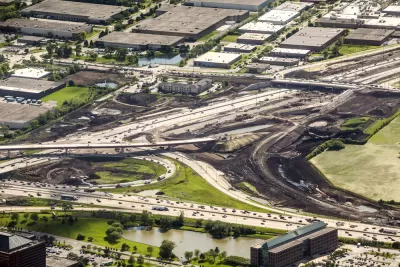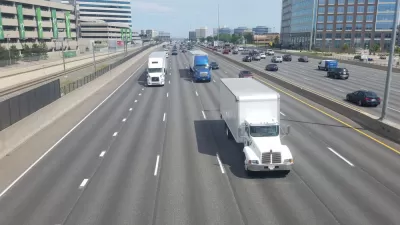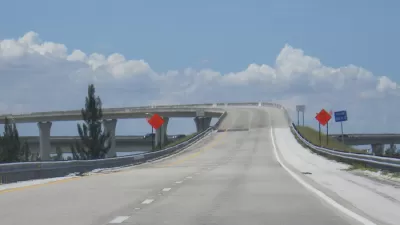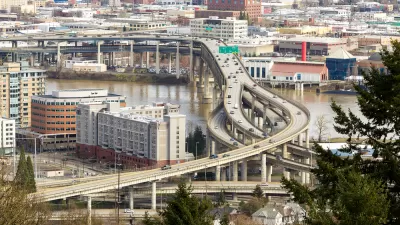U.S. PIRG has released the latest edition of the Highway Boondoggles report, the sixth edition of the report published since 2014.

The reasons for transportation planners and engineers to heed the warnings of the Highway Boondoggles 6 report, published this week by U.S. PIRG are legion. Here's how the website that shares the new report states the crises facing car-centric transportation in the United States:
America’s aging roads and bridges are in increasingly dire need of repair. Tens of thousands of people die on the roads each year and more are sickened or die from air pollution caused by vehicles. Tens of millions of Americans lack access to quality public transit or safe places to walk or bike, leaving them fully dependent on cars or – for those who cannot afford a car or are physically unable to drive – entirely shut off from critical services and opportunities.
Add that toxic mess to the economic crisis created by the coronavirus pandemic, and "Now is no time to fritter away scarce public resources on wasteful boondoggle projects."
Planetizen has noticed a spate of recent news about state and regional authorities gearing up to expand and extend highways—in defiance of these various warnings. (Click through to see the rest of the thread on the source Tweet.)
Calling attention to the recent spate of news regarding massive highway widening projects around the United States.
— James Brasuell (@CasualBrasuell) November 11, 2020
Highway Boondoggles 6 focuses on seven new projects, singling out Florida's Multi-use Corridors of Regional Economic Significance (M-Cores) program as the most potentially destructive. "This $10 billion, 330-mile, multi-highway construction project, would strain the state’s already overstretched budget in addition to impacting some of Florida’s last remaining undeveloped lands, threatening the endangered Florida panther with extinction," according to the U.S. PIRG statement. "Despite cutting $1 billion from the budget in response to the COVID-19 pandemic, the state’s 2020-21 budget, approved by Gov. Ron DeSantis, still includes $90 million for M-CORES."
Matt Casale, director of U.S. PIRG Environment Campaigns Director, says a shift in transportation spending could be a key tool in a post-pandemic economic recovery. "If we’re smarter about how we spend our transportation dollars and focus instead on building a 21st-century transportation system, America can build a better world coming out of the COVID-19 pandemic, one with less pollution, less gridlock and more public and active transit," said Caale in an emailed statement.
Now that the Highway Boondoggles report has built up a little bit of an archive, it's also possible to evaluate the outcomes of the 60 projects profiled in previous editions of the report. An interactive map offers insight into these projects on the U.S. PIRG website. A few of the 60 projects have been canceled, but most are under construction or under study and review).
Highway Boondoggles 6 also includes an evaluation of one such project: the I-94 expansion project in Milwaukee.
"This project serves as a reminder that wasteful highway construction projects can still be revived by incoming state legislators even after scheduled work and funding approval have been rescinded," according to the U.S. PIRG. "The project’s resurrection and over $1 billion price tag also comes amid budget shortfalls related to the COVID-19 pandemic: Wisconsin has suffered steep decreases in revenue and in July, Gov. Evers ordered state agencies to cut their budgets by $250 million."
The latest news shared by Planetizen on the Interstate 94 plans was written by a coalition of environmentalists in Wisconsin who describe the project as a "fiasco" and call on Wisconsin Governor Tony Evers to pull the plug.
FULL STORY: Highway Boondoggles 6

Alabama: Trump Terminates Settlements for Black Communities Harmed By Raw Sewage
Trump deemed the landmark civil rights agreement “illegal DEI and environmental justice policy.”

Study: Maui’s Plan to Convert Vacation Rentals to Long-Term Housing Could Cause Nearly $1 Billion Economic Loss
The plan would reduce visitor accommodation by 25% resulting in 1,900 jobs lost.

Planetizen Federal Action Tracker
A weekly monitor of how Trump’s orders and actions are impacting planners and planning in America.

Baltimore Ordered to Improve Sidewalk Accessibility
The city is one of many to face lawsuits for failing to comply with the Americans with Disabilities Act.

This Toronto Suburb Has More Bus Riders Than Columbus, Ohio
Brampton, Ontario used gradual improvements in service to prove that if you build it, they will ride.

Paris Bike Boom Leads to Steep Drop in Air Pollution
The French city’s air quality has improved dramatically in the past 20 years, coinciding with a growth in cycling.
Urban Design for Planners 1: Software Tools
This six-course series explores essential urban design concepts using open source software and equips planners with the tools they need to participate fully in the urban design process.
Planning for Universal Design
Learn the tools for implementing Universal Design in planning regulations.
Smith Gee Studio
Alamo Area Metropolitan Planning Organization
City of Santa Clarita
Institute for Housing and Urban Development Studies (IHS)
City of Grandview
Harvard GSD Executive Education
Toledo-Lucas County Plan Commissions
Salt Lake City
NYU Wagner Graduate School of Public Service





























